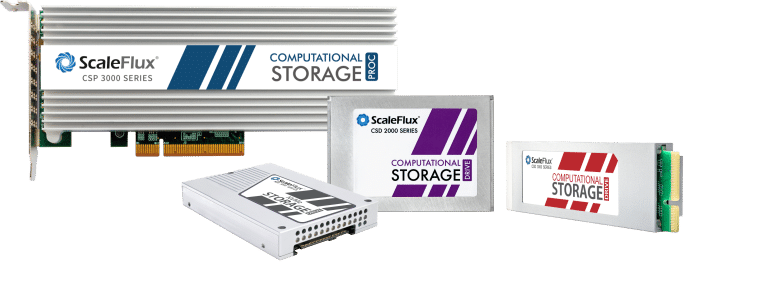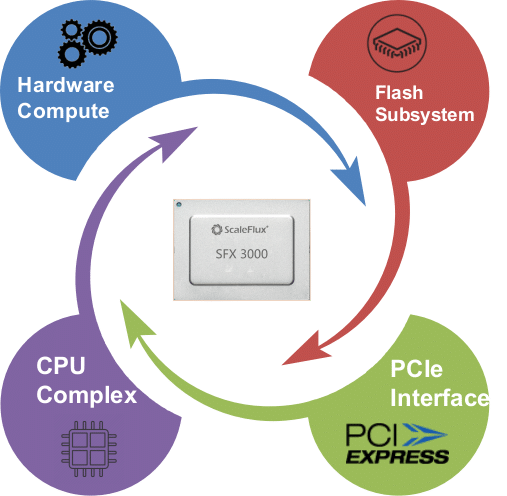ScaleFlux showcased new Computational Storage products based on the ScaleFlux SFX 3000 storage processor during OCP Summit. Computational Storage is designed to help alleviate compute and memory bottlenecks while improving ROI for data center and IT infrastructure.

ScaleFlux SFX 3000
We have been reporting on Computational Storage benefits for several years, and this new offering addresses server performance, data storage costs, latency, and NVMe SSD endurance. The SFX 3000 series of Storage Processors builds upon previous generations’ core flash management architecture and acceleration technologies.
Implementing Computational Storage can occur between host and storage, reducing data movement and taking the strain off system compute resources, and potentially improving performance. Or take those compute resources and place them within the storage itself.
The ScaleFlux SFX 3000 is based on four scalable functional blocks:
- 16-channel Flash Controller with transparent, hardware-based compression/decompression and encryption/decryption engines improving performance and endurance for SSDs.
- Hardware Compute Engines (HCE) to handle fixed-algorithm functions. The primary targets for the HCEs are tasks that can bog down general-purpose CPUs. SFX 3000 includes HCEs for: Compression/Decompression, Encryption/Decryption, Hashing, and Pattern Matching.
- Programable Cores for user-defined Computational Storage Functions. SFX 3000 includes 2 Quad-core clusters of ARM Cores.
- Configurable PCIe Interface for flexibility in deployment options. The PCIe Gen 4 interface can scale from 1×1 to 1×8 for single-port deployments, support 2×2 dual-port SSDs, and split into 2×4 with a root complex on one of the x4 ports to attach a co-processor or FPGA for added compute resources.

Storage Efficiency is the Key
The CSD 3000 series of Computational Storage Drives offers to multiply the efficiency of the infrastructure by increasing storage density and compute performance while lowering the costs of data storage. The CSD 3000 combines the features of a high-performance NVMe SSD with both Hardware Compute Engines and a Programmable core to provide a flexible, easy-to-use Computational Storage Drive solution.
The NSD 3000 series of NVMe SSDs improves the efficiency of your infrastructure, achieving 2x the performance and 2x the endurance of ordinary NVMe SSDs with similar capacity, without having to integrate any changes to the application, file system, or server management.
The CSP 3000 Computational Storage Processor provides a platform for distributing compute functions. Additionally, the CSP decouples the acceleration and offload functions from the storage device. The CSP is designed to work with any drive.
Overall, the new SFX 3000 series is a complete set of Computational Storage features addressing performance, functionality, and flexibility.
ScaleFlux also provides CSware software providing a mix of turnkey and example code to broaden adoption and deepen Computational Storage functions’ value and ease-of-use. CSware streamlines the process for customers to adopt Computational Storage Drives and as well as integrating other vendor’s kit, such as traditional NVMe SSDs and CSP cards
The new SFX 3000 Series products will be generally available in early 2022, though you can sign up for a proof-of-concept evaluation kit. Just click the request POC link on this page to send a message to ScaleFlux.
We will be providing performance detail once we get the kit in the lab, so be sure to come back for an update. We did take a look at the ScaleFlux CSD 2000 back in the summer and look forward to seeing the new drives and associated products.




 Amazon
Amazon